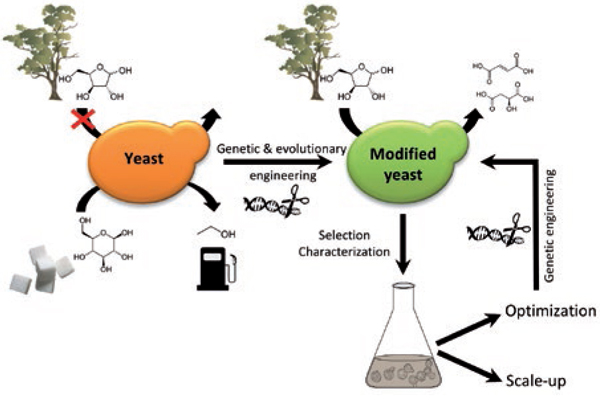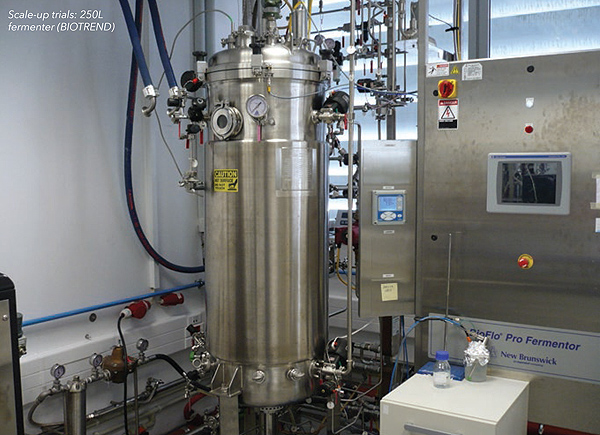Production of Dicarboxylic Acids and Bio-based Polymers Derived Thereof (The BioREFINE-2G Project)
THE BIOREFINE-2G PROJECT
The project BioREFINE-2G aims at developing commercially attractive processes for efficient conversion of pentose-rich side-streams from biorefineries into dicarboxylic acids, which can be used as precursors for bio-based polymers including biodegradable polymers.
STRAIN ENGINEERING
Microorganisms are among the most powerful resources on earth, but their potential has not yet been fully exploited. BioREFINE-2G aims at engineering the well-known baker's yeast to produce industrially relevant dicarboxylic acids. In order to develop a sustainable process, the goal is to use industrial wood waste as substrate.
Wild-type yeast can neither produce dicarboxylic acids, nor utilize C5 sugars, which are the major fermentable components of the waste streams. Furthermore, the inhibitors usually present in the complex biomass hydrolysates can significantly affect cell growth and performance.
With the aid of advanced genetic engineering, modelling tools and adaptive evolution, these challenges can be overcome and strains with the desired traits can be obtained.

Strain engineering scheme (DTU)
PROCESS DEVELOPMENT
The challenges in the process development include firstly, designing the fermentation of a complex raw material, and secondly, purifying the desired carboxylic acids from the fermented broth to a required degree of purity for polymer applications.
FERMENTATION OF A COMPLEX MEDIUM
BioREFINE-2G works with raw materials containing several sugars - including a large fraction of pentose sugars – as well as several other compounds, which may affect the physiology of the host. The yeast Saccharomyces cerevisiae is a well suited host to function in these environments.
To enable efficient fermentation, the process conditions are tuned to reach a suitable compromise between needed fermentation time, product yields and titers. This is done in close collaboration with the strain development efforts by the molecular biologists.
DOWNSTREAM PROCESSING
The development of a downstream processing method for the recovery of bio-based dicarboxylic acids faced many challenges to reach the purity standards suitable for polymerization. A multi-stage approach was developed to overcome the issues posed by the high amount of lignocellulosic impurities in the fermentation broth and by the fermentation by-products. Recovered solids from complete process experiments showed that purity specifications were achieved in high product yield. The optimization efforts in recycling and re-use of streams reduced the economic and environmental impact of the process.

POLYMERISATION METHODS
European and American biopolymer markets are experiencing huge growth expected to continue in the near future. The objective of BioREFINE-2G is to prepare biopolyesters from dicarboxylic acids obtained from genetic engineered yeast. The bio-polyesters are then converted into commercially interesting products, such as polyurethane dispersions (PUDs) and thermoplastic polyurethanes (TPUs) used as adhesives and coatings, and polylactide(PLA)-copolymers, which can be used as biodegradable packaging plastics. We have prepared bio-polyesters of different molecular weight by adjusting parameters such as temperature, pressure, reaction time and type of catalyst.
SCALE-UP AND PRODUCT DEVELOPMENT
Scale-up trials are underway to transfer the fermentation technology from lab-scale to industrial application. The process developed at lab scale by ULund will be implemented at pilot scale at Biotrend. The resulting scaled-up process will be transferred to Borregard's Demo Plant. Synergies between partners will be instrumental; for a successful scale-up of the fermentations using real raw materials and in conditions suitable for downstream processing.
Contact details:
Project website: www.biorefine2g.eu
Project coordination
DTU – Novo Nordisk Foundation Center for Biosustainability, Technical University of Denmark (Coordinator)
Contact: Dr. Irina Borodina
Email: irbo@biosustain.dtu.dk
Dissemination and exploitation:
WIP – Renewable Energies, Germany
Contact: Dr. Rainer Janssen
Email: rainer.janssen@wip-munich.de